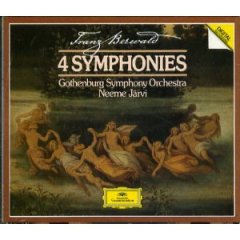Franz Berwald - 4 Symphonies (2007)
Franz Berwald - 4 Symphonies (2007)

CD1:
Sinfonie singuliere (No. 3) in C major
1. I. Allegro fuocoso [10:36]
2. II. Adagio - Scherzo. Allegro assai - Adagio [8:29]
3. III. Finale: Presto [8:24]
Sinfonie capricieuse (No. 2) in D major
4. I. Allegro [10:41]
5. II. Andante [6:58] play
6. III. Finale. Allegro assai [10:03]
CD2:
Sinfonie No.4 in E flat major
1. I. Allegro risoluto [8:05]
2. II. Adagio [5:41] play
3. III. Scherzo. Allegro molto [5:31]
4. IV. Finale. Allegro vivace [6:25]
Sinfonie serieuse (No. 1) in G minor
5. I. Allegro con energia [10:41]
6. II. Adagio maestoso [6:27]
7. III. Stretto [5:26]
8. IV. Adagio - Allegro molto [7:35]
Gothenburg Symphony Orchestra
Neeme Jarvi - conductor
Berwald was a contemporary of Schubert, although he lived to a good old age. There is no liner-note with this disc, but on consulting my Oxford Companion to Music (10th edition) I was informed that he wrote `a number' of symphonies. Haydn did that too, and Mozart, and Beethoven, -- they all wrote `a number' of symphonies, respectively 104, 41 and 9. I can clear up the mystery left by this veiled allusion in the case of Berwald to reveal that the number in his case was 4, of which this disc contains the first two.
Berwald was Swedish, but he has the German symphonic idiom to perfection. These two symphonies seem to me better not only than Schubert's own first two juvenile efforts, they seem to me better than Beethoven's first two. In quality of inspiration I would call them the equal of Schumann's, and in the matter of orchestration and fluency of construction I would say that they surpass those as well. They are distinctive in idiom without going outside the contemporary norms of that (as, say, Weber's do). You would not mistake Berwald for any of his contemporaries, and one particular feature of them that I find oddly attractive is his typically abrupt way of ending his outer movements. The second symphony has three movements only. The first has the usual four, the third of them bearing the inscrutable marking (at least on this disc) `stretto'. In musical usage this denotes overlapping entries of the subject at the end of a fugue, which is totally out of place here. In ordinary Italian the word means `stressed', which has no relevance apparent to me either. In fact the movement is in a rapid one-beat-to-the-bar 3-time, which would describe a `scherzo' in Beethoven, and I would be willing to lay a small wager that this `stretto' is simply a typo or scribal miscopying for that. The symphonies carry tedious titles of the kind also inflicted on the symphonies of Berwald's Scandinavian near-neighbour Nielsen, and it seems to me that these are best ignored. I should listen to these symphonies as `absolute' music.
Given that these works are unfamiliar to me but written in a general idiom that I've been conversant with all my life, I would say that the performances sound excellent. Tempi seem right for their markings, and there is a genuine feeling of involvement and belief in both the playing and the direction. Fine climaxes are accumulated at the end of the vigorous outer movements in each piece, and the genuinely beautiful slow movements have real depth and affection in their expression. The recorded quality is not outstanding, but it is perfectly acceptable, and the originality of the composer's scoring at many points came across to me memorably.
I don't see Berwald's symphonies scheduled very often in concert-programmes that come to my notice. They would be more likely to lure me out than many a familiar masterpiece, either contemporary or slightly later. In the meantime I have this record at my own disposal, and if you can find a copy I recommend it very warmly indeed. ---David Bryson
download: uploaded anonfiles mega 4shared yandex mixturecloud mediafire ziddu
Zmieniony (Poniedziałek, 26 Sierpień 2013 16:09)








